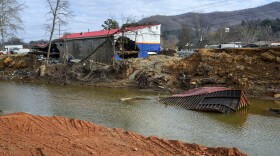A new study finds that horse whinnies are made of both a high and a low frequency, generated by different parts of the vocal tract. The two-tone sound may help horses convey more complex information.
CLIMATE NEWS
Visit our Climate News section to read more articles about how the way we live influences climate change and its impact across the Carolinas. You also can help shape our climate coverage by submitting your feedback.
MORE ENERGY & ENVIRONMENT NEWS
-
Nearly every North Carolina county is now in moderate to severe drought as the spring wildfire season ramps up.
-
A winter storm is lashing New England on Monday, bringing high winds and heavy snowfall.
-
The semi-aquatic dinosaur, Spinosaurus mirabilis, was discovered by an international team of scientists working in Niger.
-
NASA says an "interrupted flow" of helium to the rocket system could require a rollback to the Vehicle Assembly Building. If it happens, NASA says the launch to the moon would be delayed until April.
-
The Pentagon and the Energy Department have airlifted a small nuclear reactor from California to Utah, demonstrating what they say is potential for the U.S. to quickly deploy nuclear power for military and civilian use.
-
NPR's Erika Ryan reports from the site of one of the nation's largest sewage spills ever — just outside of Washington, D.C. — in January.
-
This week, North Carolina joined 22 other states in filing a motion to enforce an earlier ruling that demanded FEMA release funding for the more than 2,000 Building Resilient Infrastructure and Communities projects left in limbo nationwide.
-
The four astronauts heading to the moon for the lunar fly-by are the first humans to venture there since 1972. The ten-day mission will travel more than 600,000 miles.
-
More than 240 million gallons of raw sewage spilled into the Potomac River when a major pipeline collapsed in mid-January.
-
Drinking water around the District of Columbia hasn't been contaminated. But scientists say the environmental damage could be severe.




















